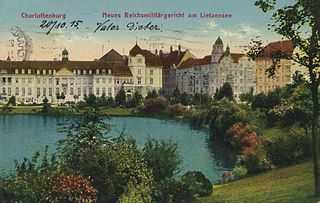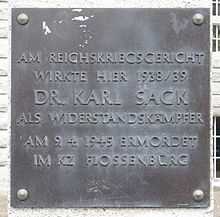German military law

German military law has a long history.
History
Drumhead courts-martial in the German lands had existed since the Early modern period. During the Thirty Years' War several Imperial states established military tribunals modelled on the jurisdiction of the Swedish Army. In Brandenburg-Prussia, justice was dispensed by special Auditeur attorneys through three official channels.
After the Prussian-led Unification of Germany, the German Empire with effect from 1 October 1900 established a particular court-martial jurisdiction (German: Militärgerichtsbarkeit) to try soldiers of the German Army, with the Reichsmilitärgericht (RMG) in Charlottenburg as the supreme court. In Prussia it replaced the Generalauditoriat agency, while the Kingdom of Bavaria retained the right to pass judgements to members of the Bavarian Army by a separate (the 3rd) senate. The presiding judge in the rank of a general or admiral was appointed directly by the German Emperor.
During World War I, German military law enabled military courts to try not only soldiers but also civilians held to have violated the military law. Especially well-known is the case of Edith Cavell, the English nurse court-martialled and executed in occupied Brussels in 1915 for having helped POW's escape - which was indeed a capital offence under the German military law of the time.
Nazi Germany

In the post-war Weimar Republic (1919-1933), separate courts-martial including the RMG were abolished according to Article 106 of the Weimar Constitution - but they were revived by the Nazi government after the Machtergreifung, enacting a special law on 12 May 1933. Initially the Reichsgericht in Leipzig, from 1 December 1934 the "People's Court" (Volksgerichtshof) in Berlin, acted as final appellate court, until the Reichskriegsgericht (RKG) was established as high court of the Wehrmacht armed forces by another directive with effect from 1 October 1936. The RKG was based in the former RMG building on Witzlebenstraße in the Charlottenburg district of Berlin.
A directive on a special criminal law of war was already enacted on 17 August 1938 by OKW chief Wilhelm Keitel at the behest of Führer Adolf Hitler. From the beginning of World War II the court convicted not only Wehrmacht members but also POW's and civilians in the area of operations. The RKG acted as the first and last resort for 44 criminal offenses under penalty of death, such as:
- High treason (Hochverrat),
- State treason (Landesverrat), primarily espionage
- War treason (Kriegsverrat), a diffuse term applied to all kind of actions that may affect the military strength like
- Subversion of military strength (Wehrkraftzersetzung), which encompassed even critical statements
- Conscientious objection (Kriegsdienstverweigerung) and desertion (Fahnenflucht).
Between 1939 and 1945 the RKG in Berlin was responsible for over 1,400 executions, including those of the Red Orchestra. In 1943 the court was transferred to Torgau, where it was based until the end of the war. In 1951 the building became the temporarily base of the Berlin Kammergericht (appellate court), since 2005 it is a private estate.
With the arms buildup and continued warfaring, the number of Wehrmacht courts-martial increased to over 1,000. On 13 May 1941 Hitler had Keitel pass a directive, according to which any Wehrmacht officer had the authority to execute accused civilians in the area of Operation Barbarossa and the Eastern Front without trial. Against the laws of war, the official repeal of criminal prosecution led to widespread hostage-taking, mass executions, burning and looting by German forces.
After the German Instrument of Surrender, Nazi courts martial were not abolished by the Allied Control Council until 20 August 1946. In 2002 and 2009 the German Bundestag parliament has finally passed bills to suspend the verdicts against Wehrmacht for desertion and homosexual activity as well as against "war traitors".
Current situation
Since 1949, the Federal Republic of Germany has no special military courts. Criminal acts committed by soldiers are tried in ordinary criminal courts by civilian judges.
Art. 96 para. 2 Basic Law (Grundgesetz) allows for the creation of specialised military courts in case of war and for soldiers sent abroad, subject to a federal law. Such a law has not been passed.
Smaller offences are being handled by disciplinary courts which are attached to the administrative court system. They may only pronounce disciplinary punishments, but no criminal sentences (e.g. no imprisonment, except 21 days of detention in the watch room).
Commemorative plaques
-

Plaque to conscientious objectors and resistance fighters at the former Reichskriegsgericht in Berlin
-

Plaque to Franz Jägerstätter at the former Reichskriegsgericht in Berlin
-

Plaque to Karl Sack at the former Reichskriegsgericht in Berlin
See also
- War crimes of the Wehrmacht
- Military law
- Court martial
- Command and obedience in the Bundeswehr
- Franz Jägerstätter
- Karl Sack
External links
- (German) Luise Berlin - Reichskriegsgericht (Gedenktafel, Geschichte, Literatur)
- (German) Berlin-Lexikon: Reichskriegsgericht